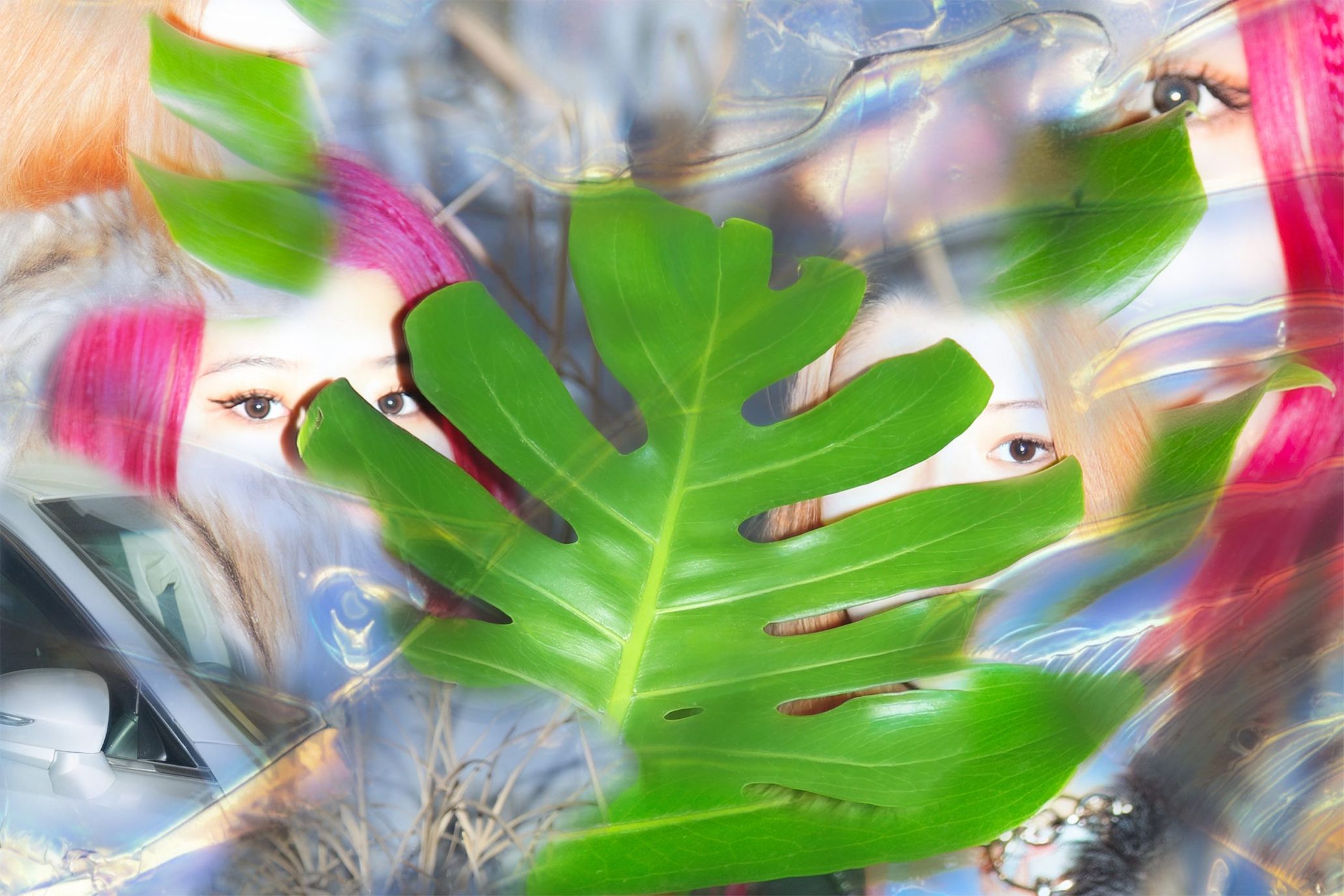
tamanaramen
Audiovisual unit consisting of older sister Hana (visual artist) and younger sister Hikam (singer/producer). They began working as a unit in 2021 after initially having solo artist careers. Through a fusion of abstract soundscapes, a whisper-like vocal quality, and visuals that reflect the texture of the skin and their consistent flow, the duo is able to create a unique worldview that is unlike any other. Their music and visuals mix together without borders, transcending genres and scenes.
Twitter:@tamanaramen
Instagram:@tamanaramen
When I first listened to tamanaramen, I felt a coolness and a faint, hazy presence from them, as if I was being let in on some wonderful secret. Like a carefully folded letter, their sound, words, footage, nature, concept, and expressions were quietly waiting to be read by someone. Similarly, kuki (2019) was so gentle, almost too delicate for it to be their first EP. Organ (2019) gave off a sense of unrest and expectation, as if something was slowly awakening, little by little. We saw different sides of them surface with mabataki (2020), and their music took on a life of its own with the release of sour cream (2020). Eventually, we all collectively shed tears to future (2020), in which the forest, light, and life were translated directly into sound.
After that, tamanaramen delivered some new songs in bits and pieces, but no more news of a release in the form of a cohesive EP. Everyone has been waiting for new music from them. In 2023, their EP Hajimari and its music video were released, and they hosted their first release party. There, the sisters were reflected more clearly than ever before.
From the abstract and icy style of their previous works, I had sensed something of a coldness in tamanaramen. However, the sisters I actually spoke with were rather warm and malleable, sharing a gentle sense of humor, which made me understand why tamanaramen’s expressions are always positive. The sisters describe the space created by their live performances as “a place where everyone is isolated but equally connected”. What does that mean? I hope you will be touched by their conversation, so full of respect.

— This release is the first one in a while.
Hikami: We started production in 2021 and was planning a release at the beginning of 2022, but I got sick. We had to keep postponing, and we were finally able to release the EP. Our previous EP was released in 2020, so it’s been three years since we released a full project.
— I see. Have you recovered from your sickness?
Hikami: Yes, I’m better now.
— I’m happy to hear that. This EP’s title is Hajimari (beginning). What was it the beginning of? This time around, I personally got the impression that you were clearer in where you wanted to take both the music and the artwork.
Hana & Hikami: Yes, yes.
Hikam: The work the two of us do hasn’t changed. I write the songs, and my older sister (Hana) makes the artwork, music videos, and the video elements. We showed our faces for the first time in our last piece “friday”, so this project is a new “beginning” in that regard.
Hana: We also started living together.
Hikami: That’s true, that’s another “beginning”.
Hana: Until recently, we both worked in the living room at our family home. Now that we started living together, we have our own rooms so we have a little time apart. (Looks over at Hikam) We’ve become independent.
Hikam: Exactly.
— Was there a change in the songwriting process?
Hikam: (Looks over at Hana) Not really?
Hana: My sister also wrote the songs this time, maybe up to the melody? And then we wrote the lyrics together and recorded it. We chose a couple out of the bunch of songs we wrote and consolidated it into an EP.
— Hikam, do you usually have an initial idea of the kind of music you want to make and then try to realize it, or do you find a good sound and build it up as you go along? Which process is more common for you?
Hikam: I’ve never made a reference track, so I look for sounds more often. That process is fun.
— What sounds have you been responding to recently?
Hikam: I’ve been liking the sound of club music lately. I got really into “Rumble” by Skrillex and Fred Again.
— What music have you two always listened to?
Hana: Bossa Nova.
— That’s unexpected.
Hana: I don’t really like hyper pop, but my sister does.
“We want tamanaramen to be a pop presence”

— Out of the songs in your new EP, “friday” was especially pop-influenced, more than any of your other songs.
Hikam: We want tamanaramen to be a pop presence.
Hana: My sister likes a wide variety of music. Tamanaramen is genreless precisely because of this. We make music we want when we want it, which is why we have a lot of sides to us. Just as one person is multifaceted, so is tamanaramen.
— Both of your answers have been so interesting. Hikam is abstract, and Hana explains and materializes those thoughts.
Hikam & Hana: Hehehe (laughs).
— Do your conversations always have these roles?
Hana: I’m not sure?
Hikam: I think we actually take on opposite roles in our daily conversations (laughs).
— I understand you separate the work of songwriting and visuals. Do you share ideas and opinions with each other during your production processes?
Hikam: We show each other what we’ve done when we reach the halfway point. We’re like, “This is what I have so far, what do you think?”
— Do you praise each other?
Hikam: Yeah. We say, “That’s great!” or “Love it!”, and compliment each others’ work, but we also give our honest opinions if we prefer something else.
— Have you noticed any changes in the way you view each other since you started living together and becoming more independent?
Hikam: I don’t think so? My sister is loved by the friends around her. She’s someone who people can’t stay mad at.
Hana: You think? Hikam is very decisive. For example, she suddenly quit the middle school she took an entrance exam to get into. The other day, she exclaimed, “I feel like going to Okinawa tomorrow” and went straight there immediately after the club. She’s decisive and quick to turn her decision into action. It’s impressive. She’s strong.
Hikam: Is that a good thing? (Laughs).
Hana: I’m complimenting you. (Laughs).
Why they’re doing tamanaramen

— The visuals for this EP were photographed by Ayaka Endo. It’s very distinctive.
Hana: I’ve always liked Ayaka Endo’s work, and we’re friends. I knew the time was now to ask her to be a part of this project.

— tanmanaramen has appeared in art events and has many connections in the art community.
Hana: We don’t have any music-related friends. We’re only close with artworld people… Easygoing types.
Hikam: Easygoing types…? (Laughs)
— (Laughs). You had a release party at Shibuya WWW on March 9th. I believe this was also a first for you. Why did you decide to do this now?
Hikam: It was time.
— Your EP is called Hajimari (beginnings), so it’s like a re-debut of sorts?
Hikam & Hana: Exactly!
Hikam: I like that, it’s fresh.
— tamanaramen is now in its fourth year since debuting, and is now graduating the newcomer phase. I think this kind of freshness is usually hard to find at this point in an artist’s timeline. It’s usually when artists start to feel more self-conscious.
Hana: What you’re saying reminded me of when we had to stop production because Hikam got sick. I thought our career as a duo was over then. But that transformed into being a time for us to stop for a second and watch and listen to our past work. By reflecting on our past, we gained more confidence because we were able to reaffirm our skills. That was our “beginning”, and looking back, it was a crucial time.
— You’re saying that there were things that became clear only when you stopped to look at it.
Hana: After looking back at our past works, we thought some of the things we did in a more rough way were quite good. There was a time I was weirdly self conscious and thought I had to shoot with a film camera. But I realized that’s not our production process.
Hikam: I used to be someone who made music for myself so that I wouldn’t forget about the events that took place or the emotions that arose at that time. But I think I’ve slowly started to think outwardly. Tamanaramen has enabled me to see things objectively. Perhaps I’ve begun to keep my distance, in a good way. I’ve started to think about the nuance of me seeing everyone’s tamanaramen from a different vantage point.
— Perhaps you’re able to see yourselves objectively now.
Hikam: It comes down to why we do tamanaramen. Of course our love for music is a prerequisite, but we want a space where we can all come together and create.
Isolated but equally connected

— You previously mentioned that you want tamanaramen to become a big, tent-like presence.
Hikam: We also have a BtoB DJ unit called 4NGEL KIDZ (angel kids). We had our first party at Enter Shibuya the other day. All types of people were there, old and young. It was the best kind of distance, where no one was isolated… actually, everyone was isolated but equally connected. We passed around a notebook for everyone to write in. Everyone, including those in the corner, wrote in it.
— I love that concept of everyone being lonely but being equally connected.
Hana: It’s like a community without a central figure. It’s not like there’s one charismatic person that everyone flocks to. We’re all on the same plane.
— It’s not a centralized rule.
Hana: Exactly. The loneliness Hikam felt during COVID, the friends we made during that time, and the communication founded within the context of those relationships are the themes of this EP.
Hikam: We made Hajimari about a year after I started college. All my classes were online, so I was mostly remote. I only went in person three times, including for health checkups. I led a suffocating life then, and perhaps that is reflected in my work. When I looked around me, I noticed my younger brother starting high school and adults going back to work in person. College students were the only people left behind. That was the kind of insolation I felt.
— Are you still a college student?
Hikam: I took a year off, but I ended up dropping out because I wanted to do music.
Hana: Nothing to lose, right? (Laughs).
Hikam: Nope!
— Everyone’s lonely but no one is alone. Being on a level playing field is ideal. But it may be difficult to build that environment. You’ve always cited social and political events of the world as an important backdrop to your work. Wouldn’t you want to let your opinions and stances be known if such things are important in the work you create?
Hana: Our work is meant to connect people with different views. We want to honor the nuances in our music that enable people of differing opinions to like the same song. It would be fine if it was on a personal level, but we try not to be divisive with tamanaramen.
— Do you exchange specific opinions between the two of you?
Hana: Unlike with tamanaramen, we have conversations like that pretty often. I’ve been told in the past that if I don’t declare my opinions, I’m on the side of the perpetrators or complicit in their actions. But I think that’s different. The space we create should be a place that respects different opinions and values. It would be ideal to be able to maintain a relationship where we can have unbiased discussions.
— What type of person, compared to the average listener, do you think gather around tamanaramen?
Hana: I think there are a lot of nice people. That’s only what I assume, though (laughs).
— What do you think about when considering tamanaramen’s future?
Hikam: The more I think about it, the more I realize I’ve started to become the person who I wanted to be when I was in high school.
— What kind of person is that?
Hikam: At the time, I couldn’t go to clubs, and I wanted to go see foreign artists’ shows. I dreamt of playing big venues like Shibuya WWW and being invited as a guest artist for foreign acts (laughs).
— You’ve realized those dreams!
Hana: I want to be active abroad, too. Maybe I can move at the end of my lease.
Hikam: By the way, we found out when we received attention from a Russian internet bulletin that the name tamanaramen is good luck in Russia.
— If you were to live elsewhere, where would you go?
Hana: London or Berlin. But I like London.
Photography Taisuke Nakano
Coordinator Yoshiko Kurata
Translation Mimiko Goldstein

■Streaming EP Hajimari
1.yurikago
2.moving like a wind
3.ebi
4.friday
5.baby fish
https://jvcmusic.lnk.to/tamanaramen_hajimari

